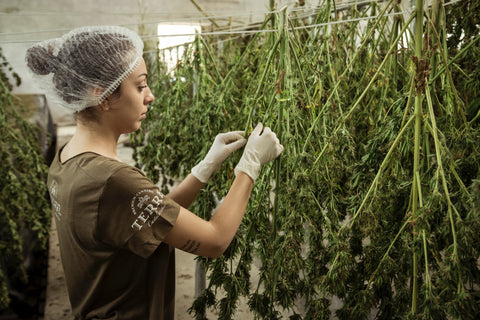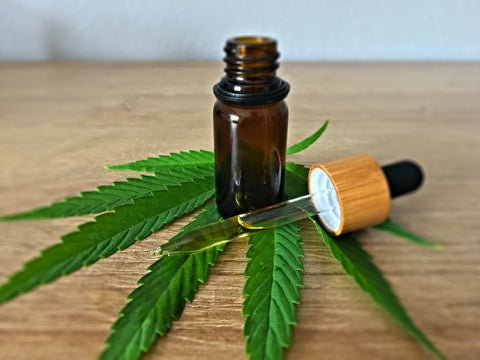Which Marijuana Compound Is More Beneficial: THC or CBD

What Is Marijuana?
Marijuana is often confused for Cannabis, so much so that some people confidently use the two terms interchangeably. However, marijuana is simply one of the variants of the cannabis plant.
Cannabis is a genus that comprises several species, also known as strains. The two primary strains of Cannabis include Cannabis sativa and Cannabis indica. Cannabis sativa is the species that produces marijuana, while indica strains produce another variant of the plant known as hemp.
The fundamental difference between marijuana and hemp is that marijuana contains significant levels of 9-delta tetrahydrocannabinol (THC) while hemp mostly produces cannabidiol (CBD). However, CBD can also come from marijuana strains.
CBD and THC are the two most popular compounds derived from cannabis plants, also known as cannabinoids. It’s important to remember that Cannabis contains more than 130 compounds (also known as cannabinoids). But CBD and THC are the two most widely-studied cannabinoids.
Cannabidiol is famous for its therapeutic properties and is useful for the treatment of medical conditions.
CBD is effective in the treatment of diseases that are symptomized by pain, anxiety, seizures, inflammation, and insomnia. On the other hand, 9-delta tetrahydrocannabinol delivers the famous euphoric effects, thanks to its psychoactive properties.
As you shall find out, there are plenty of more differences between CBD and THC.

Differences Between Cannabidiol and 9-delta Tetrahydrocannabinol
Extraction
As previously mentioned, CBD is mostly extracted from hemp, while THC comes from marijuana. However, marijuana plants also contain CBD.
Hemp plants contain less than 0.3% of THC, which makes it economically unviable to extract THC from these plants. On the other hand, marijuana boasts more than 0.3% concentration of THC.
Chemical Structure
Since they come from the same plant, both cannabidiol and 9-delta tetrahydrocannabinol feature the same molecular structure. Their structures contain 21 carbon atoms that are bonded together with 30 hydrogen and 2 oxygen atoms.
However, there’s a slight variance in the arrangement of atoms in the molecular structures of CBD and THC. And it’s that difference that accounts for the distinct effects each compound has on your body.
Effects on the Body
How CBD and THC affect the body depends on a few factors, including their molecular formulae, method of consumption, dose and whether the user is new or regular. There’s also the question of product source. Experts recommend buying marijuana products from reputable vendors.
In terms of the interactions with your system, both CBD and THC impact your endocannabinoid system. The Endocannabinoid System (ECS) refers to a system of endogenous cannabinoids which is responsible for restoring normal body functions. Some of the functions of the ECS include pain relief, mood regulation, treatment of anxiety, etc. Besides endogenous cannabinoids, the ECS also contains cannabinoid receptors as well as hormones and enzymes that regulate normal homeostasis.
For the most part, the ECS is effective at performing its role. But in severe conditions, patients may require a boost in the form of phytocannabinoids (cannabis-derived cannabinoids). And this is where CBD and THC come in.
Both CBD and THC interact with your body’s cannabinoid receptors, mostly CB1 and CB2 receptors. CB1 receptors are generally located in the brain and the central nervous system, while CB2 receptors are spread throughout the rest of the body. CBD mostly interacts with CB2 receptors, while THC impacts the activity of CB1 receptors. Both interactions trigger the release of the brain’s neurotransmitters, which respond by relieving pain and anxiety.
But as we also mentioned, the arrangement of atoms in the structure of CBD and THC differ slightly, which impacts the psychoactive properties of the compounds. The ability of THC to readily bind with CB1 receptors located in the brain accounts for its psychoactive and intoxicating effects. On the other hand, CBD is neither psychoactive nor intoxicating, as it either binds too weakly to CB1 receptors or doesn’t bind to them at all. That explains why experts recommend CBD for mediating the mind-altering effects of THC.
Modes of Administration and Dosage
CBD comes with various methods of consumption, such as;
- Dripping oil tinctures beneath your tongue;
- Ingesting edibles, such as gummies;
- Vaping CBD juice;
- Externally applying creams, balms, and topicals; and
- Swallowing capsules and tablets.
The most common method of ingesting THC is by smoking marijuana. However, you can also find THC in edibles, tinctures, vape oils, and capsules. One should always procure the best CBD vape juice for anxiety.
In terms of dosage, CBD doesn’t have an ideal dose, as the dose depends on the condition and the age and weight of the patient. However, as THC is intoxicating and psychoactive, experts recommend experimenting with smaller doses.

Medical Benefits
CBD mostly treats conditions that manifest in pain, anxiety, inflammation, and seizures. Examples of such diseases include arthritis, post-traumatic stress disorder, Inflammatory Bowel Syndrome, and Multiple Sclerosis.
Other medical conditions that CBD can help with are:
- Psychosis and mental disorders
- Insomnia
- Migraines
- Nausea, especially nausea related to certain treatments like chemotherapy
THC can help with;
- Muscle spasticity
- Nausea and loss of appetite
- Pain
- Anxiety
- Glaucoma
- Insomnia
Legality
The legality status of marijuana varies depending on the state or country. In the U.S, the federal government still classifies cannabis as a Schedule 1 Drug. That makes it, and by extension, marijuana, federally illegal.
However, the signing into law of the 2018 Farm Bill by President Donald Trump legalized the cultivation, distribution, and use of hemp in all 50 states.
Since CBD mostly comes from hemp, it enjoys a more favorable legality status compared to THC. One can easily procure a cannabis vape pen Canada through trusted vendors as its legal in all parts of the US.
Hype and Popularity
Both CBD and THC have gained considerable popularity over the past few years, thanks to the ever-rising endorsements of both compounds. CBD is mostly endorsed by medical research bodies, while THC enjoys the support of influencers and celebrities.
Therefore, CBD is generally popular among medical marijuana users, while THC receives wider recognition from recreational marijuana users.
How to get higher on marijuana?

- CHANGE UP YOUR METHOD
- CHANGE UP YOUR ROUTINE
- SMOKE AFTER A WORKOUT
- TAKE YOUR TIME INHALING
The psychoactive strength of cannabiscan be high. But it can sometimes decrease or not feel as strong. Here are our tips on "how get high".
Conclusion: Which Is Better?
Both CBD and THC come with various medical benefits. The two substances also deliver mild and short-lasting side effects. However, CBD is mostly recommended for therapeutic purposes. THC alters your mental state, which makes it popular for recreational use. If you are a beginner marijuana user, your best bet is to start with CBD and go slow on THC.



